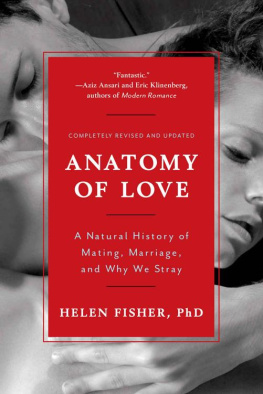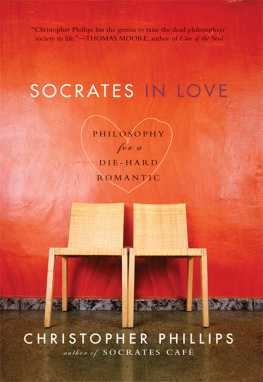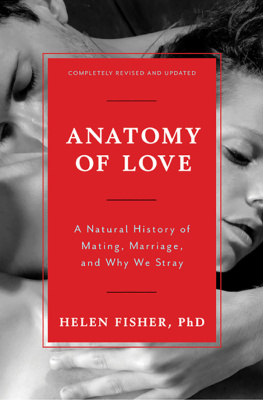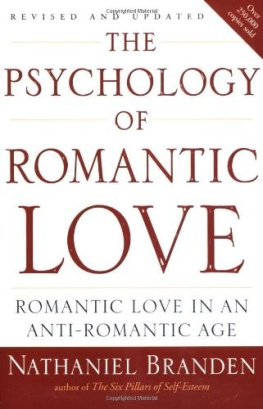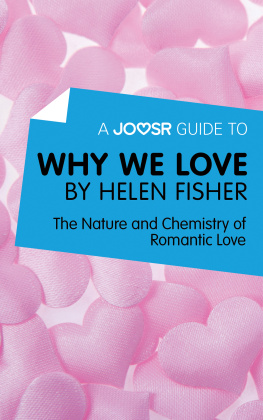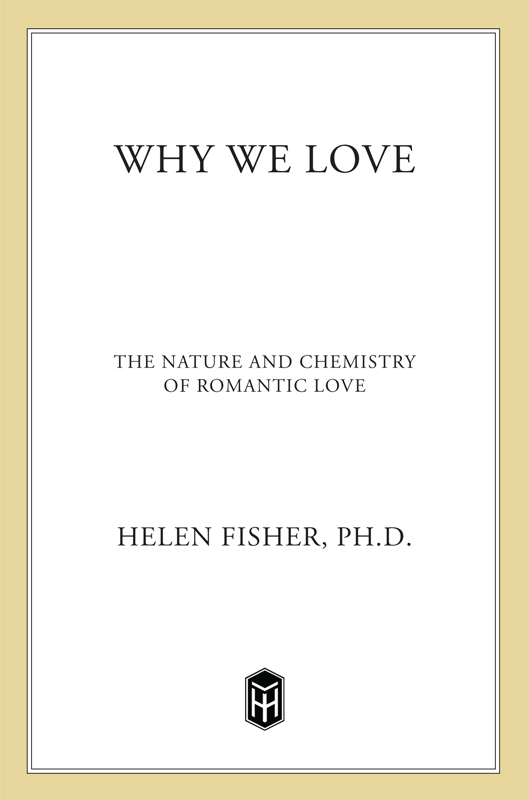
The author and publisher have provided this e-book to you for your personal use only. You may not make this e-book publicly available in any way. Copyright infringement is against the law. If you believe the copy of this e-book you are reading infringes on the authors copyright, please notify the publisher at: us.macmillanusa.com/piracy.
Contents
For Lorna, Ray, Audrey,
and the rest of my family
(Hark close and still what I now whisper to you,
I love you, O you entirely possess me,
O that you and I escape from the rest, and go utterly off,
free and lawless,
Two hawks in the air, two fishes swimming in the sea
not more lawless than we;)
That furious storm through me careering.
I passionately trembling;
The oath of the inseparableness of two together,
of the woman that loves me, and whom I love
more than my life, that oath swearing,
O I willingly stake all for you,
Walt Whitman
From Pent-up Aching Rivers
To the Reader
What is love? Shakespeare mused. The great bard was not the first to ask. I suspect our ancestors pondered this question a million years ago as they sat around their campfires or lay and watched the stars.
In this book I have tried to answer this seemingly unanswerable question. Several things motivated me. I have loved and won and loved and lost; I have certainly experienced the joy and agony of romantic love. Moreover, I am convinced that this passion is a foundation stone of human social life, that just about every human being who has ever lived has felt the ecstasy and the despair of romantic love. Perhaps most important, a clearer understanding of this whirlwind may help people find and sustain this glorious passion.
So in 1996 I began a multipart investigation to unravel that mystery of mysteries, the experience of being in love. Why we love. Why we choose the people that we choose. How men and women vary in their romantic feelings. Love at first sight. Love and lust. Love and marriage. Animal love. How love evolved. Love and hate. The brain in love. These became major themes of this book. I also hoped to gain some insight into how we might control this unpredictable and often dangerous fire in the heart.
Romantic love, I believe, is one of three primordial brain networks that evolved to direct mating and reproduction. Lust, the craving for sexual gratification, emerged to motivate our ancestors to seek sexual union with almost any partner. Romantic love, the elation and obsession of being in love, enabled them to focus their courtship attentions on a single individual at a time, thereby conserving precious mating time and energy. And male-female attachment, the feeling of calm, peace, and security one often has for a long-term mate, evolved to motivate our ancestors to love this partner long enough to rear their young together.
In short, romantic love is deeply embedded in the architecture and chemistry of the human brain.
But what actually produces this thing called love?
To investigate this, I decided to make use of the newest technology for brain scanning, known as functional magnetic resonance imaging (fMRI), to try to record the brain activity of men and women who had just fallen madly in love.
For this important part of my investigation, I was fortunate to be joined by two exceptionally gifted colleagues, Dr. Lucy L. Brown, a neuroscientist at the Albert Einstein College of Medicine, and Dr. Arthur Aron, a research psychologist at the State University of New York at Stony Brook. Debra Mashek, then a doctoral candidate in psychology at SUNY Stony Brook, Greg Strong, another SUNY psychology graduate student, and Dr. Haifang Li, a radiologist at SUNY Stony Brook, all talented individuals, also played crucial roles. Over a period of six years, we scanned the brains of more than forty men and women who were wildly in love, collecting some one hundred forty-four pictures of brain activity from each. Half of our participants were men and women whose love was reciprocated; the rest had recently been rejected by someone they adored. We wanted to record the range of feelings associated with being in love.
The results were startling. We found gender differences that may help explain why men respond so passionately to visual stimuli and why women can remember details of the relationship. We discovered ways in which the brain in love changes over time. We established some of the brain regions that become active when you feel romantic ecstasy, information that suggests new ways to sustain romance in long-term partnerships. I came to believe that animals feel a form of romantic attraction for one another. Our findings shed new light on stalking behavior and other crimes of passion. And I now understand more about why we feel so depressed and angry when we are rejected, and even some ways to stimulate the brain to soothe the anguish.
Most important, our results changed my thinking about the very essence of romantic love. I came to see this passion as a fundamental human drive. Like the craving for food and water and the maternal instinct, it is a physiological need, a profound urge, an instinct to court and win a particular mating partner.
This drive to fall in love has produced some of humankinds most compelling operas, plays, and novels, our most touching poems and haunting melodies, the worlds finest sculptures and paintings, and our most colorful festivals, myths, and legends. Romantic love has adorned the world and brought many of us tremendous joy. But when love is scorned, it can cause excruciating sorrow. Stalking, homicide, suicide, profound depression from romantic rejection, and high divorce and adultery rates are prevalent in societies around the world. Its time to seriously consider Shakespeares question: What is love?
I hope this book will be as useful to you as writing it has been to me, in our mutual and eternal dance with this monumental force: the instinct to fall in love.
What Wild Ecstasy: Being in Love
The world, for me, and all the world can hold
Is circled by your arms; for me there lies,
Within the lights and shadows of your eyes,
The only beauty that is never old.
James Weldon Johnson
Beauty That Is Never Old
Fires run through my bodythe pain of loving you. Pain runs through my body with the fires of my love for you. Sickness wanders my body with my love for you. Pain like a boil about to burst with my love for you. Consumed by fire with my love for you. I remember what you said to me. I am thinking of your love for me. I am torn by your love for me. Pain and more pain. Where are you going with my love? Im told you will go from here. I am told you will leave me here. My body is numb with grief. Remember what Ive said, my love. Goodbye, my love, goodbye. So spoke an anonymous Kwakiutl Indian of southern Alaska in this wrenching poem, transcribed from the native tongue in 1896.
How many men and women have loved each other in all the seasons that preceded you and me? How many of their dreams have been fulfilled; how many of their passions wasted? Often as I walk or sit and contemplate, I wonder at all the heartrending love affairs this planet has absorbed. Fortunately, men and women around the world have left us a great deal of evidence of their romantic lives.
From Uruk, in ancient Sumer, come poems on cuneiform tablets that hail the passion of Inanna, Queen of Sumeria, for Dumuzi, a shepherd boy. My beloved, the delight of my eyes, Inanna cried to him over four thousand years ago.


